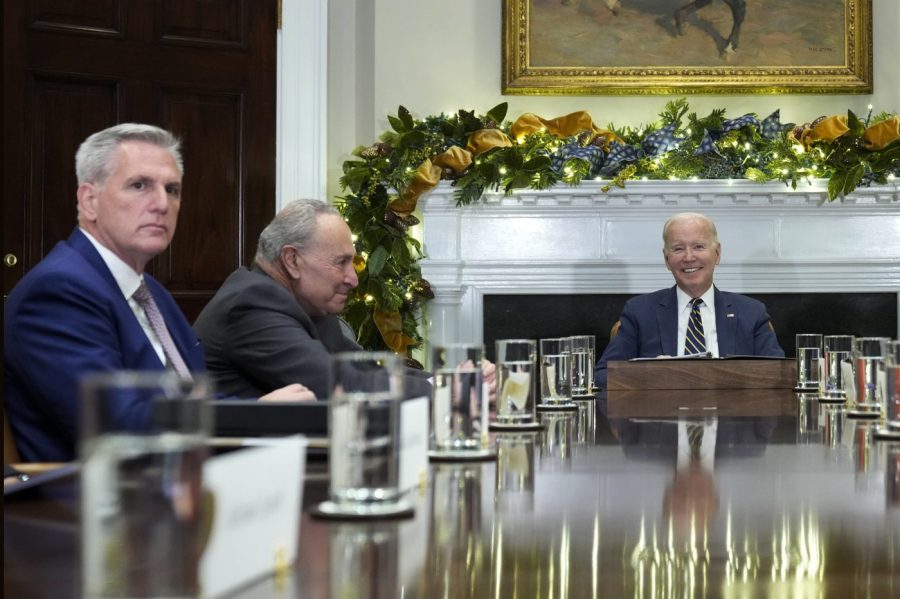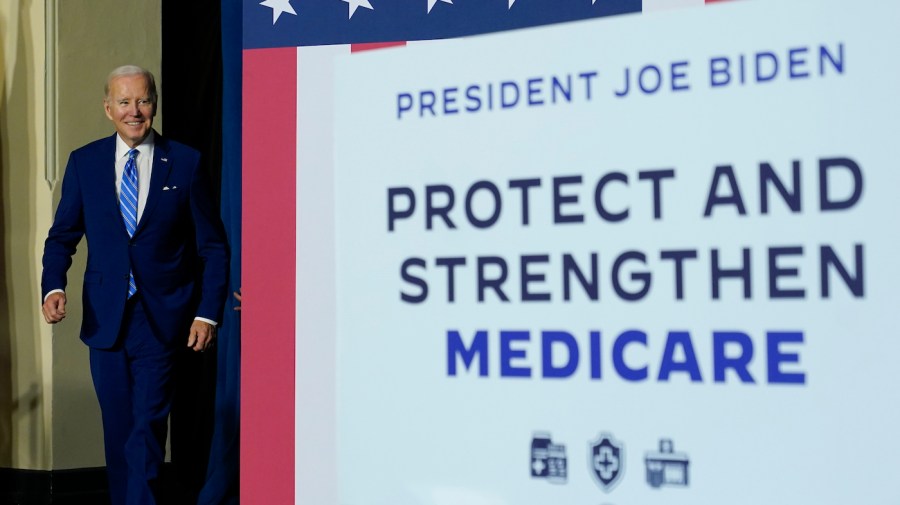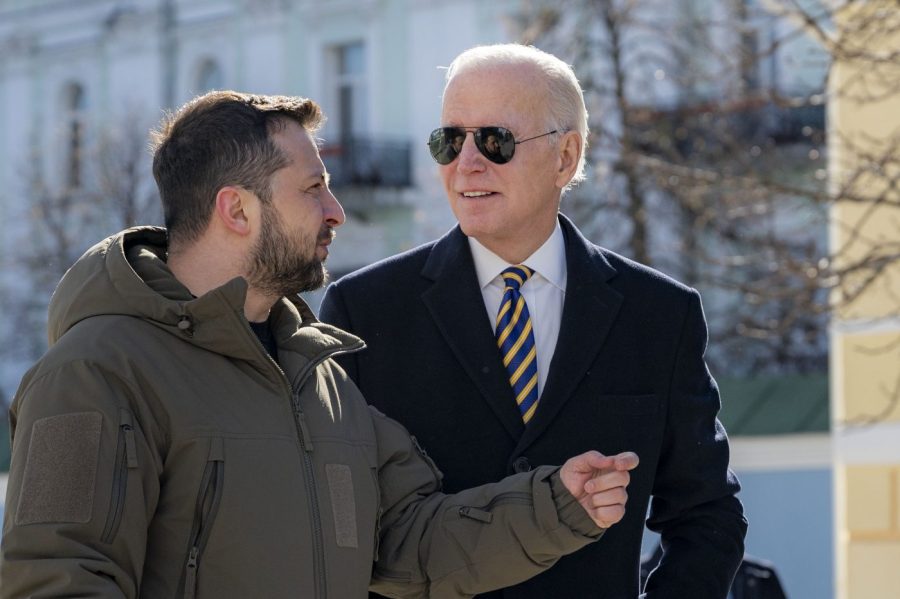Five takeaways from Biden’s $6.8 trillion budget
President Biden on Thursday unveiled his long-awaited budget request for fiscal 2024, setting the stage for what is expected to be a challenging, high-stakes spending battle over the coming months.
Much of the ambitious proposal faces a tough chance getting past the divided Congress, but many Democrats see the request as a framework for what the party plans to push in spending talks with Republicans later this year.
Biden’s $6.8 trillion budget proposes tax hikes on wealthy to reduce deficit, shore up Medicare
Here are five takeaways from Biden’s budget:
Biden is leaning into long-shot tax hikes
Much of Biden’s budget hinges on trillions of dollars worth of proposed tax increases targeting the wealthiest Americans and major corporations.
The proposals include a so-called “billionaire” minimum tax aimed at imposing a tax of at least 25 percent on total income for Americans whose wealth exceeds $100 million, and raising the corporate tax rate from 21 percent to 28 percent. Biden also called for quadrupling the stock buybacks tax and upping the tax rate on U.S. multinationals’ foreign earnings.
Here’s what Biden’s 2024 budget does on taxes
The proposals would undo some key provisions of the 2017 Trump tax cuts, and therefore will be a non-starter for Republicans.
Administration officials have been adamant they will not raise taxes on households making less than $400,000, instead calling on some of the richest individuals to pay more.
The White House says the proposals would help cover $3 trillion in deficit reduction over the next decade, but also serves to show just how much daylight stands between the administration and the GOP over how to address the debt.
“We will see tax policies here that say to the richest Americans and large corporations — you know, some of whom, until we passed the Inflation Reduction Act, paid no taxes — that you have to begin to pay your fair share,” White House budget director Shalanda Young told reporters.
Biden digs in heels for budget fight

In addition to tax increases on the wealthy, Biden presses for boosts for spending for Democratic priorities and nondefense programs, in a sharp contrast to plans pushed by House conservatives to tackle the nation’s deficits with steep spending cuts.
The budget requests $688 billion in funding for nondefense programs, up 7.3 percent from the previous fiscal year, as well a proposed $121 billion in Veterans Affairs Medical Care Program funding. It also calls for $880 billion in funding for defense programs for fiscal 2024, up 3.3 percent from policies enacted the previous year.
Republicans—who control the House—have panned the request it as “dead on arrival” in Congress. The GOP has called for a deal on significant reductions in government spending, particularly on the nondefense side, in exchange for Republicans votes to raise the debt limit.
“Mr. President: Washington has a spending problem, NOT a revenue problem,” Speaker Kevin McCarthy (R-Calif.) tweeted shortly after the rollout, while also accusing Biden of proposing “trillions in new taxes that you and your family will pay directly or through higher costs.”
Biden says he’ll meet with McCarthy ‘anytime’ on budget
Biden and McCarthy met at the White House on Feb. 1 for preliminary talks about the debt ceiling, and the two sides expressed optimism after that. But Thursday’s budget release reflects how far apart the two sides are on the issue of spending.
“What are they going to cut?” Biden said in Philadelphia on Thursday, referring to Republicans. “What about veterans’ benefits? What about law enforcement? What about aid to rural communities? What about support for our military. How will they make these numbers add up?”
A spotlight on Social Security, Medicare

Biden’s budget aims to protect both Medicare and Social Security, previewing what appears to be an early focal point of a likely 2024 reelection campaign.
The request features a plan he previewed earlier this week aimed at extending solvency for Medicare into the 2050s, including a proposal to impose a higher tax rate on “earned and unearned income above $400,000” and measures seeking to lower costs for beneficiaries.
The pitch faces a tough battle in the divided Congress, where Republican leaders have drawn red lines around proposals to raise any taxes. But it serves as a marker for where the White House stands on the matter, as it seeks to contrast its proposals with those offered by Republicans aimed at potentially drawing down spending on the benefits side.
Biden launches battle on Capitol Hill with call for Medicare tax hike
The request also included proposals aimed at strengthening Social Security, but it did not offer a similar plan to protect the program’s solvency, and instead reiterated the White House’s opposition to attempts to “cut Social Security benefits.”
It also left the door open to cooperation with Congress to work “to responsibly strengthen Social Security,” but “by ensuring that high-income individuals pay their fair share.”
The focus comes as some Republicans have sought to pressure on Biden to bring more attention to the funding issues threatening the program, as a recent projection from the Congressional Budget Office found the program was on track to becoming insolvent in 2032.
At the same time, a bipartisan group of senators has been exploring potential solutions to protect the program’s solvency, but there is still hesitancy on both sides of the aisle in ramping up talks.
Republicans pan ‘unserious’ offer
Presidential budgets typically are dead on arrival on Capitol Hill, and the same was true of Biden’s proposal on Thursday.
McCarthy called Biden’s proposed budget “unserious,” citing the trillions of dollars worth of tax hikes targeting wealthy Americans and corporations.
Some Republicans were quick to note that while the White House said the proposal would slash the deficit by $3 trillion over the next decade, it would add more than $1 trillion to the deficit next year.
GOP lawmakers also took issue with Biden allocating funding for reproductive health programs, a State Department program to advance gender equality, and money to combat climate change globally.
Sen. Rick Scott (R-Fla.), a top foil for the White House, tweeted that Biden’s budget “should be a wake-up call for the American people. He isn’t concerned about reducing the debt or lowering inflation. He’s focused on throwing money at his woke agenda.”
White House officials on Thursday struggled to point to specific proposals that might garner bipartisan support, but gave a nod to the slew of bipartisan legislation that was passed during Biden’s first two years in office.
More money for Ukraine aid, border security

Biden’s budget includes more funding for the war in Ukraine and increases funding for border security, two hot button issues sure to come up in conversations with Republicans.
It includes $6 billion overall to support Ukraine, as well as support the U.S. alliance with NATO and other European allies. Over $750 million of that would go to Ukraine to continue to counter Russia’s invasion.
Some Republicans, including Senate Minority Leader Mitch McConnell (R-Ky.) and other GOP leaders, have joined in on bipartisan support for Ukraine and pressed for more aid to the wartorn country.
But others have pushed back on more funding, including Rep. Marjorie Taylor Greene (R-Ga.), Rep. Matt Gaetz (R-Fla.), and former President Trump, who used the Conservative Political Action Conference last week to attack the Biden administration for continuing to help Ukraine.
The U.S. government has given nearly $80 billion to Kyiv, including more than $32 billion in lethal aid.
The budget also increases the amount Biden proposed for Customs and Border Protection and gives more funding to hire border agents and combat fentanyl trafficking. The increase comes as the Republican-led House has put a spotlight on the U.S.-Mexico border and Biden has been under fire to do more to stop the influx of migrants.
Republicans have also pounced on the decrease in funding overall to the Department of Homeland Security. The House Budget Republicans on Thursday griped that the budget “cuts $600 million from the Department of Homeland Security, while there is a raging crisis at the nation’s southern border.”
Copyright 2024 Nexstar Media Inc. All rights reserved. This material may not be published, broadcast, rewritten, or redistributed..













